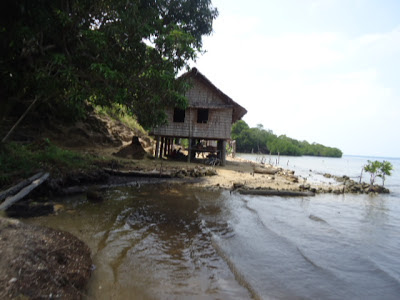 |
| Spent my 2012 Christmas on Sudest Island, Milne Bay Province, PNG |
As I
write this in Port Moresby I am wishing that the many Christmas celebrations I
had with my cousins, uncles, aunties, and many Bubus in the village unfolds
again for me. Those years in my youth were times I spent more in the village
without care about how much money we need, Christmas gifts, luxurious holidays,
or those wild drinking parties and night-outs in the clubs. In some sense the
simple village holidays were always eventful and sometimes outlandish, but
civil according to our mentors. We were a civil bunch they say.
The
Christmas is a time to also pause in our busy lives for a well-deserved
break. Many of us have been working full
steam this year. We need this time to pause for that one week between December
25th and January 02nd to find some quality time to be
with our families and relatives. It is a time to wish everyone a Merry
Christmas and Happy Holidays.
It
is a time for us to celebrate a renewal of spirit in the life we have through
the celebrations we accept in the Christian calendar as the Birth of baby Jesus
in Jerusalem. It is a time of peace and happiness for all Christians.
Jesus
was born in the manger with no crib for a birth. This is part of a Christmas
Carol that I can never get out of my head as I think about the simple and
humble birth of Jesus. It is true that sometimes we forget that and make
Christmas look so expansive and beyond the simplicity to which the reference
was originally made. I think this is part of the problem with today’s modern
celebrations with so many complicated styles of celebrating Christmas.
Let
me tell a story. I spent as many as five Christmas living in the United States
of America. One of the pleasures of Christmas was to drive around the
metropolis admiring the light works people go through the trouble of putting up
on their houses and yards. The more competition the more bigger they became
every year. In our pleasures of seeing the best light shows we forget that it
is about the simple beginning of the birth of Jesus. The light shows were not
really about the birth of Jesus, they were about something else that now I can
only think of as modern exhibition of material fetish in fluorescence
display.
The
celebration of the simple birth of Jesus is often felt with the sharing of
presents among friends and families on Christmas Eve. Around 10.am the presents
are open and by 11.00pm a brunch is had among those who shared presents. The
afternoon is spent attending organized activities such as sports or visit to a
zoo or other events, and perhaps a dinner together. The next day is, of course,
the Boxing Day when shops are open for return of goods purchased, which have
some default or that can be refunded for cash value.
Our
society Papua New Guinea is also changing so fast. The way we celebrated
Christmas before may not be the same now.
We may also forget celebrating Christmas in a simple way that gives more
meaning to that experience than if we indulge ourselves in expansive Christmas
celebrations.
In
many PNG villages people will celebrate the Christmas together with some of the
traditional cultural events that are held at this time of the year. It could be
canoe racings, yam harvests, traditional singsings, or peace-making ceremonies.
Some communities have long observed the entire month of December as important
to the end of the year festivities to mark various important events or
achievements of the tribe or village or community as a whole. It is an ideal time for such celebrations. Many
people return home for vacation during that time. It makes sense to celebrate
together with everyone home for Christmas.
It
is important that people return to the simple things in life during the
Christmas period. In whatever way Christmas is celebrated it is important for
people to maintain a sense of simplicity and humbleness. Keep things simple and
enjoy the holiday period this year.
I do
hope the Christmas period will be stress free for many people who are on their
recreational leave. Try not to over-commit yourself with many of the trappings
of holiday obligations. Returning to work in the New Year with a zero balance
in your account is a stress inducing experience. Remain committed to basics and
simple expressions of yourself.
In
many of our communities the spirit of Christmas in the Christian sense of it
will prevail. Many people will follow the rituals of Christmas with their
hearts and minds. In the same token many will also offer their prayers and help
to those who need help. One of the special gifts anyone can give to those who
are in need is a little kindness and love.
In
whatever way we choose to celebrate Christmas and remember the birth of Jesus
Christ, we must do so with humility, humbleness, and in simplicity. We need to remind ourselves that Christmas is
a time to renew our faith and review the life we have lived so far.
Have
we followed the path that we were meant to take or have we veered off the road
to where we did not want to go.
It
is a time for reflections of our own purpose for being here on this earth. We
need to ask ourselves what God wants us to do.
Comments
It's been said that any bettor must watch this,
Watch this or stop placing bets on sports...
Sports Cash System - Advanced Sports Betting Software
Post a Comment